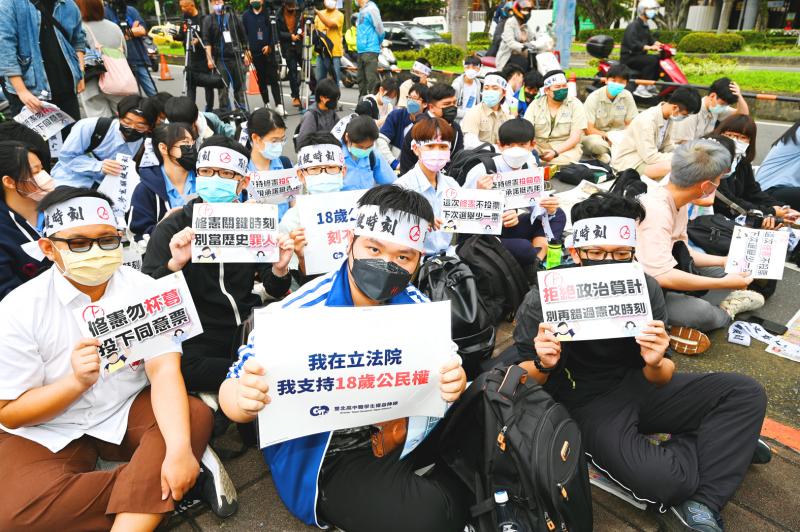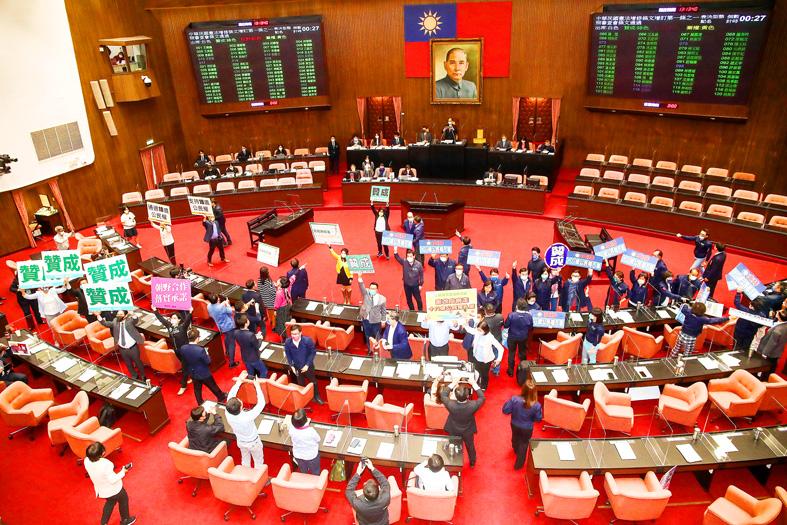Lawmakers across party lines yesterday voted to approve a constitutional amendment to lower the voting age from 20 to 18, clearing the amendment’s path to a referendum later this year.
The proposed bill was put to a vote on the legislative floor yesterday afternoon as dozens of high-school students and representatives of non-governmental organizations mobilized outside the Legislative Yuan building in Taipei to express their support for the amendment.
The final vote was 109-0, surpassing the minimum 82 “yes” votes required for the bill to clear the legislature.

Photo: Tien Yu-hua, Taipei Times
The result was a victory for student and civic groups, many of which have spent years trying to bring Taiwan’s voting age in line with most other democratic countries.
Constitutional amendments must first clear the legislature with the approval of at least three-quarters of lawmakers present at a meeting attended by a minimum of three-quarters of all lawmakers, according to the Additional Articles of the Constitution of the Republic of China (中華民國憲法增修條文).
Once an amendment is approved by the Legislative Yuan, it must be voted on in a national referendum. It passes if half of all eligible voters cast ballots in its favor.

Photo: CNA
Civil society groups had expressed hope that the bill would clear the legislature yesterday so it could be voted on in a referendum on the same day as local elections in November, as nationwide elections are more likely to attract a higher voter turnout.
The bill to grant Taiwanese aged 18 or older the right to vote was cosponsored by the Democratic Progressive Party (DPP), the Taiwan People’s Party and the New Power Party.
Previously, supporters of the amendment expressed concern that the bill might not pass the legislature because the Chinese Nationalist Party (KMT) had not committed itself to voting in favor of the amendment, although it had expressed support for lowering the voting age.
Based on the distribution of seats in the 113-seat legislature, where the DPP has 61 seats and the KMT has 39 seats, the bill could only clear the body with the support of both parties.

DAREDEVIL: Honnold said it had always been a dream of his to climb Taipei 101, while a Netflix producer said the skyscraper was ‘a real icon of this country’ US climber Alex Honnold yesterday took on Taiwan’s tallest building, becoming the first person to scale Taipei 101 without a rope, harness or safety net. Hundreds of spectators gathered at the base of the 101-story skyscraper to watch Honnold, 40, embark on his daredevil feat, which was also broadcast live on Netflix. Dressed in a red T-shirt and yellow custom-made climbing shoes, Honnold swiftly moved up the southeast face of the glass and steel building. At one point, he stepped onto a platform midway up to wave down at fans and onlookers who were taking photos. People watching from inside

A Vietnamese migrant worker yesterday won NT$12 million (US$379,627) on a Lunar New Year scratch card in Kaohsiung as part of Taiwan Lottery Co’s (台灣彩券) “NT$12 Million Grand Fortune” (1200萬大吉利) game. The man was the first top-prize winner of the new game launched on Jan. 6 to mark the Lunar New Year. Three Vietnamese migrant workers visited a Taiwan Lottery shop on Xinyue Street in Kaohsiung’s Gangshan District (崗山), a store representative said. The player bought multiple tickets and, after winning nothing, held the final lottery ticket in one hand and rubbed the store’s statue of the Maitreya Buddha’s belly with the other,

‘NATO-PLUS’: ‘Our strategic partners in the Indo-Pacific are facing increasing aggression by the Chinese Communist Party,’ US Representative Rob Wittman said The US House of Representatives on Monday released its version of the Consolidated Appropriations Act, which includes US$1.15 billion to support security cooperation with Taiwan. The omnibus act, covering US$1.2 trillion of spending, allocates US$1 billion for the Taiwan Security Cooperation Initiative, as well as US$150 million for the replacement of defense articles and reimbursement of defense services provided to Taiwan. The fund allocations were based on the US National Defense Authorization Act for fiscal 2026 that was passed by the US Congress last month and authorized up to US$1 billion to the US Defense Security Cooperation Agency in support of the

‘COMMITTED TO DETERRENCE’: Washington would stand by its allies, but it can only help as much as countries help themselves, Raymond Greene said The US is committed to deterrence in the first island chain, but it should not bear the burden alone, as “freedom is not free,” American Institute in Taiwan Director Raymond Greene said in a speech at the Institute for National Defense and Security Research’s “Strengthening Resilience: Defense as the Engine of Development” seminar in Taipei yesterday. In the speech, titled “Investing Together and a Secure and Prosperous Future,” Greene highlighted the contributions of US President Donald Trump’s administration to Taiwan’s defense efforts, including the establishment of supply chains for drones and autonomous systems, offers of security assistance and the expansion of